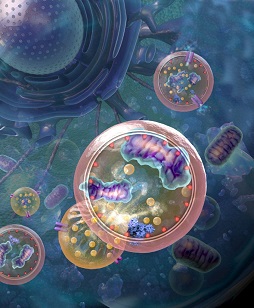BREAKING! Mutations On Omicron Non-Structural Protein 6 (Nsp6) Alters Viral Disruption Modes Of Autophagy In Host, Leading To Possibly More Serious Long Term Issues!
Source: SARS-CoV-2 Omicron Autophagy Disruptions Jan 06, 2022 3 years, 11 months, 2 weeks, 3 days, 2 hours, 23 minutes ago
A new study by European researchers from Université de Lorraine-France, Universidad de Alcalá-Span and Université de Paris-France has found that the Omicron variant with its unique mutations on the non-structural protein 6 (Nsp6) has a different mode compared to the rest of the SARS-CoV-2 variants in terms of affecting the host immune systems’ autophagy processes with implications for more serious long term health issues or long COVID issues.

Despite exhibiting milder symptoms in certain segments of the general population, the Omicron variant is different form the various known SARS-CoV-2 in so many ways as emerging studies are showing. Already a previous study has confirmed that the Omicron variant that has done a complete biological about-face of shifting from gaining entry via cell surface fusion following proteolysis by TMPRSS2 to entry via endosomal fusion after activation by the endosomal proteases Cathepsin B or L.
https://www.thailandmedical.news/news/breaking-omicron-has-shifted-to-using-cathepsins-for-cell-entry-via-endosomal-fusion,-impacting-cellular-tropism-and-pathogenesis
There is also the high possibility that the Omicron is also shifting its focus away from the ACE2 receptors to gain cell entry to using other human host receptors such as CD147, Neuropilin‐1, Dipeptidyl peptidase 4, alanyl aminopeptidase (ANPEP), glutamyl aminopeptidase (ENPEP) and angiotensin II receptor type 2 (AGTR2).
https://www.thailandmedical.news/news/breaking-study-alarmingly-shows-omicron-could-be-possibly-evolving-to-shift-its-focus-on-human-receptors-from-ace2-to-ddp-iv,-similar-to-mers
https://www.thailandmedical.news/news/good-news-preliminary-unpublished-data-shows-that-omicron-might-not-affect-lungs-much,-rather-your-brains,-heart-and-other-organs-are-targets
To date, it is already known that the viral cycle of SARS-CoV-2 is based on a complex interplay with the cellular machinery, which is mediated by specific proteins eluding or hijacking the cellular defense mechanisms.
Importantly among the complex pathways disrupted or called by the viral infection, autophagy is particularly crucial and is strongly influenced by the action of the non-structural protein 6 (Nsp6) interacting with the endoplasmic reticulum membrane.
Significantly the non-structural proteins 6 or Nsp6 is mutated in the recently emerged Omicron variant, suggesting a possible different role of autophagy.
The study team explored, for the first time, the structural property of Nsp6 thanks to long-time scale molecular dynamic simulations and machine learning analysis, identifying the interaction patterns with the lipid membrane.
The study findings also showed how the mutation brought by the Omicron variant may indeed modify some of the specific interactions, and more particularly help anchoring the viral protein to the lipid bilayer i
nterface.
Interestingly, in addition to the many mutations on the spike coding sequence, the Omicron variant also present the deletion of three amino acids, namely L105, S106 and G107, from the Nsp6 sequence. The three deleted aminoacids are located at the polar head/water interface where they connect, via a distorted loop, two trans-membrane a-helices.
The study team utilized molecular dynamic simulations on the mutated protein to be compared with the one originated from the native Wild Type strain.
The mutation of Nsp6 in the Omicron variant, consisting in the deletion of a triad of amino acids at the polar head interface, has been pinpointed as a potential concerning mutation due to its possibility of altering the modulation of autophagy by favoring the interaction with the membrane.
The molecular basis underlying autophagy will be due to the recruitment of lipid, specifically PIP2, by Nsp6 and the subsequent formation of the autophagosome vesicle.
Therefor any mutation which would favor the interaction with the membrane is susceptible to alter this mechanism.
Although the study team found that the global structure of Nsp6 is not altered by the point mutation, in particular concerning the transmembrane core, they found important modification of the structure and dynamic of the peripheral helices, as illustrated by the flexibility signature perturbation.
More specifically, the study findings that the peripheral helices in the Omicron variant are more buried in the polar head region compared to the Wild type SARS-CoV-2 strain, hence suggesting stronger interaction and an increased capacity of recruiting specific lipids.
The study findings were published on a preprint server and are currently being peer reviewed.
https://www.biorxiv.org/content/10.1101/2022.01.05.475107v1
The study findings suggest an even more aggressive autophagy disruption and also possibly faster manifestations of the ill effects of such disruptions.
SARS-CoV-2 autophagy disruptions can lead to a wide range of health and medical conditions arising.
Already one past study has shown that autophagy disruption by the SARS-CoV-2 coronavirus could lead to a rise in cancers including colorectal cancers.
https://www.thailandmedical.news/news/breaking-new-international-study-warns-that-sars-cov-2-infections-will-lead-to-cancers-especially-colorectal-cancers-due-to-disruption-in-autophagy
The study findings of the present research clearly point to a different modulation of the autophagy between the Omicron variant and the Wild type variant which may in part explain both the immune system resistance of the Omicron variant and its different pathological evolution.
The study team plans in the near future to pursue this study on the one side including explicitly PIP2 in their simulations and on the other side experimentally comparing the induction of autophagy in cell lines in which WT or Omicron Nsp6 would have been expressed.
Please have a heart and help to support and sustain this website and all our research and community initiatives by making a donation. You help truly means a lot and helps saves lives directly and indirectly. Thank You.
https://www.thailandmedical.news/p/sponsorship
For more on how the Omicron variant is different from other previous SARS-CoV-2 variants in terms of how it affects the various host cellular pathways, keep on logging to Thailand Medical News.
